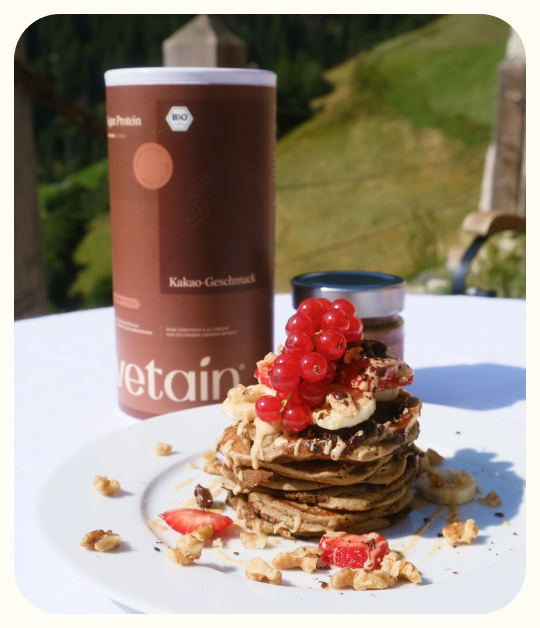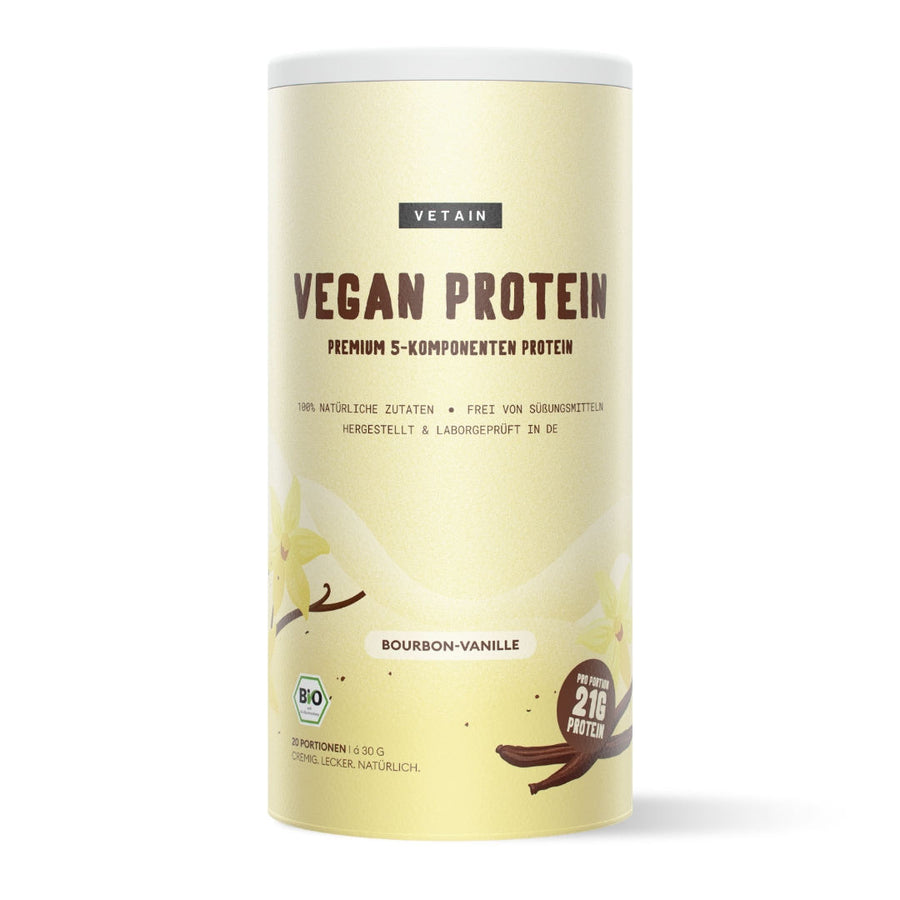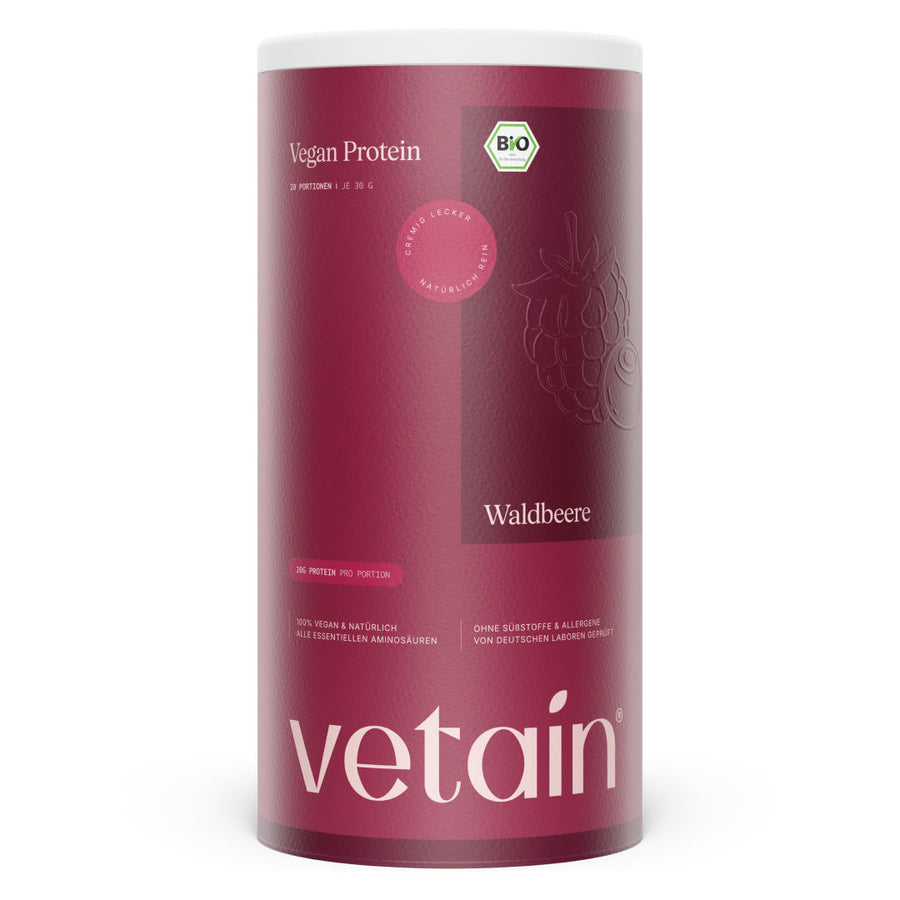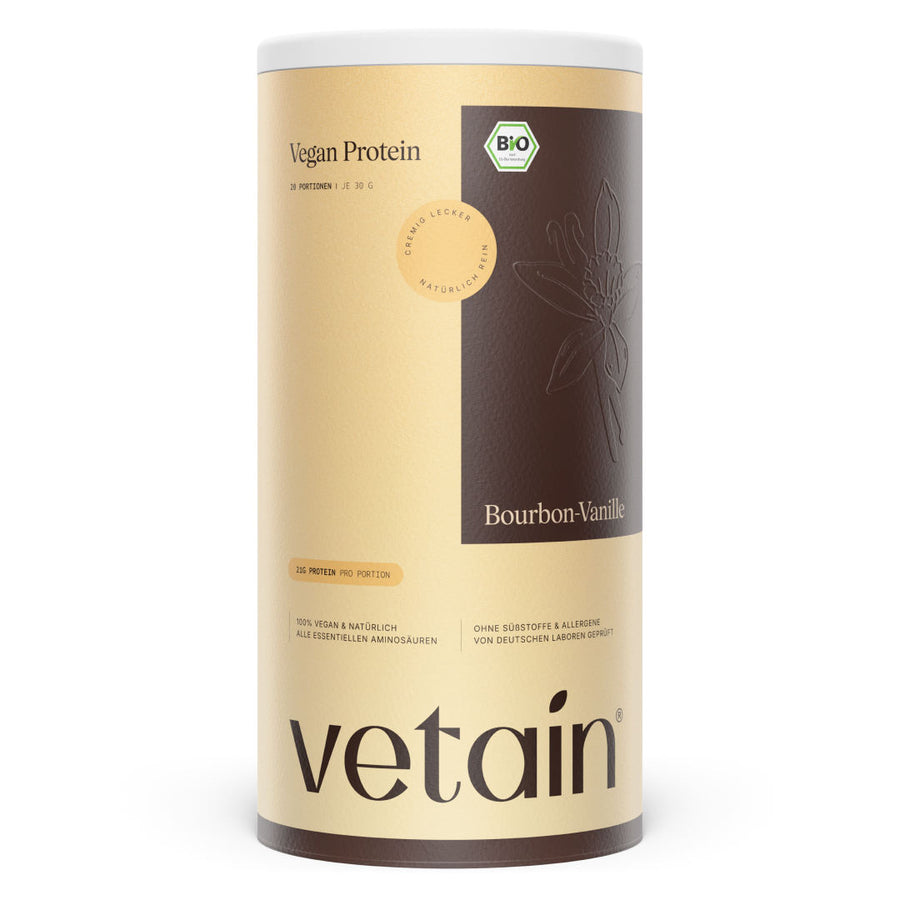For many, protein powder is a fixed part of their diet — whether as a convenient training supplement or simply to meet daily protein needs. While whey protein was long considered the undisputed standard, more and more people are turning to plant-based alternatives. But one term comes up quickly when it comes to vegan protein powder: biological value.
You may have heard that animal protein is supposed to be superior here because it is “better utilized.” Or that vegan proteins don’t contain all essential amino acids and are therefore worse for muscle building. But is that really true? In this article, we’ll take a closer look at what this means, whether vegan products really perform worse, and how you can make use of plant-based protein sources. One thing is certain: the quality of a protein is not determined by just one factor.
What does biological value actually mean?
Before we evaluate vegan protein powder based on biological value, let’s first explain what it means. In short, it describes how well the body can convert a consumed protein into body protein. The higher the biological value, the more efficiently the body can use the protein it contains.
A quick biology refresher: Amino acids are the building blocks of proteins, needed by the body for many processes. Especially important are the nine essential amino acids, which the body cannot produce itself and must therefore obtain through food. The biological value of a protein depends on how complete and bioavailable this amino acid profile is.
Biological value – plant vs. animal proteins
As you already know: the higher the value, the better the body can utilize the protein for various functions. For comparison, whole egg is used as a reference with a value of 100. This means the body can use this dietary protein very efficiently. All other protein sources are measured against this. Animal products such as whey, casein, meat, or fish generally have high biological values because they contain all essential amino acids in an optimal ratio. They are therefore considered “complete proteins.”
Plant alternatives initially provide lower values since they don’t always contain all essential amino acids in the ideal amounts. But that doesn’t mean they’re worse — rather, optimal use requires a more conscious combination of different protein sources. Although biological value is an important factor for vegan protein powder, it alone does not determine the quality of a product. Other aspects such as digestibility, nutrient profile, and individual tolerance also play a role. And the same applies to animal proteins: although they are biologically optimal, their quality still varies — and not every option is equally suitable for everyone.
Biological value of different plant-based protein sources
Not all plant proteins are equal — some provide a more complete amino acid profile and are better utilized by the body than others. What matters most is how balanced the amino acids are and how well the body can absorb the protein. Here’s an overview of some plant-based protein sources and their biological value.
Pea protein – biological value approx. 65–70
Pea protein scores with a high protein content and good tolerance. It’s particularly rich in lysine, an essential amino acid often lacking in other plant sources. However, it contains little methionine, which slightly limits its utilization.
Rice protein – biological value approx. 80
Rice protein has a better amino acid balance than many other sources. It’s especially rich in methionine, but low in lysine. To achieve higher biological value as a vegan protein powder, it’s often combined with pea protein.
Hemp protein – biological value approx. 87
Hemp protein offers a naturally balanced amino acid profile and also provides omega-3 fatty acids, a practical bonus especially for vegans. It is considered easy to digest and well tolerated. Still, its utilization is somewhat lower than animal proteins because it contains less lysine.
Soy protein – approx. 90–96
Soy is one of the few plant proteins that provide a nearly equivalent alternative to animal protein. It contains all essential amino acids in sufficient amounts and is considered a complete protein source. It’s especially popular in sports as a substitute for whey.
Pumpkin seed protein – approx. 75–80
Alongside a good protein content, pumpkin seed protein provides additional nutrients such as magnesium and antioxidants. It’s highly digestible, though it contains slightly lower amounts of lysine and threonine compared to other plant proteins.
Lupin protein – approx. 75
Lupin protein is (rightfully) becoming more popular as it provides a balanced amino acid profile and is easy to digest. It’s a good alternative to soy and supplies all essential amino acids, though not always in ideal ratios.
How vegan protein powder is optimized for high biological value
Pure plant protein is often not utilized as efficiently as animal protein because not all essential amino acids are always present in perfect ratios. This is where modern vegan products come in: by strategically combining different plant proteins, utilization can be significantly improved. Many manufacturers use blends where amino acids complement each other to form a complete profile. A classic example is pea and rice protein: while pea is low in methionine and rice is low in lysine, together they balance out deficiencies and provide a source comparable in quality to whey.
Often, additional plant proteins are included to further optimize the amino acid profile. Hemp, pumpkin seed, or lupin protein not only bring micronutrients but also contain phytonutrients and unsaturated fats. Processing also plays a decisive role. Modern production methods isolate protein to make it highly digestible. Some products also include added free amino acids or fermented proteins to further improve absorption.
The result? Vegan protein powder no longer has to hide when it comes to biological value. Thanks to clever combinations and processing, plant proteins can be just as effective — while also providing additional nutrients such as fiber, vitamins, and antioxidants.
%-split_content-%
Good vegan protein powder – is biological value the most important factor?
It’s an important indicator of protein quality — but only part of the picture. While it shows how efficiently the body can use the protein, other crucial factors play just as big a role.
Digestibility – how well can the body absorb the protein?
Not every protein source is digested equally well. Some people have trouble with whey since it comes from milk and may contain lactose — which can cause bloating or stomach issues. Plant-based options like pea, rice, or hemp protein are often easier to digest and better tolerated.
Nutrient density – more than just protein
Plant proteins often provide additional nutrients beyond protein. Fiber and fats like omega-3 from hemp contribute to a balanced diet, and minerals like magnesium, iron, and zinc support key bodily functions. While animal proteins are usually viewed in isolation, plant proteins bring a broader spectrum of nutrients that enrich the overall diet.
Individual tolerance – what works best for you?
Everyone’s body reacts differently to nutrients. Some digest animal proteins without issues, while others struggle. Likewise, not all plant proteins are equally well tolerated. What matters is not just the value on paper but how your body actually absorbs it and how you feel.
Why plant proteins are still a strong choice
Even though amino acid balance is often used as a benchmark, plant proteins prove competitive thanks to smart blends and additional benefits. Modern vegan protein powders demonstrate this: high biological value, good tolerance, and packed with extra nutrients.
Vegan protein powder & biological value: how processing makes a difference
Not only the raw materials but also processing plays a decisive role in the biological value of vegan protein powders. Depending on production methods, absorption can be improved or hindered. One important aspect is protein isolation. High-quality vegan powders are often offered as isolates — a highly concentrated form with minimal carbs and fats. This increases utilization because the protein is provided in a pure, easily digestible form.
Digestibility also matters. Some plant proteins naturally contain antinutrients like phytic acid or lectins, which can inhibit absorption of certain amino acids. Through processes like fermentation, sprouting, or enzymatic breakdown, these compounds are reduced, making the protein more bioavailable. Product composition is another key factor. To achieve high biological value, many manufacturers combine different plant sources to provide a complete amino acid profile. Blends of pea, rice, hemp, or pumpkin seed proteins can bring biological value close to that of animal proteins.
%-product_content-%
Conclusion: Vegan protein powder & biological value – a strong combination
Biological value is an important factor when it comes to protein quality — but not the only one. Thanks to smart combinations, modern processing, and targeted optimization, vegan protein powders are now on par with animal alternatives. They provide not only high-quality protein but often also additional nutrients such as fiber, vitamins, and healthy fats.
Whether for conscious nutrition or as a training supplement — plant protein sources are now a complete option. With the right blend and production quality, vegan protein ensures reliable protein intake without compromises.















 9 Min
9 Min
 Zuletzt aktualisiert am 30.10.2025
Zuletzt aktualisiert am 30.10.2025




